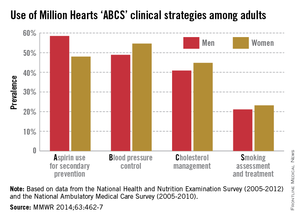According to its main indicators, the Million Hearts initiative to prevent 1 million heart attacks and strokes by 2017 is falling short of its clinical goals, the Centers for Disease Control and Prevention said May 29.
The four main clinical measures of the Department of Health & Human Services’ initiative are aspirin use for secondary prevention, blood pressure control, cholesterol management, and smoking awareness and treatment, or ABCS. The population-level goal of Million Hearts is to achieve 65% or higher prevalence in each of the ABCS measures, the CDC investigators noted (MMWR 2014;63:462-7).
The latest update of the ABCS measures shows that 53.8% of adults (58.5% of men and 48% of women) are using aspirin for secondary prevention of cardiovascular disease, 51.9% (48.9% of men and 54.6% of women) have their blood pressure under control, 42.8% (40.9% of men and 44.8% of women) are managing their cholesterol, and only 22.2% of tobacco users (21.1% of men and 23.2% of women) were prescribed smoking treatment, they reported.


